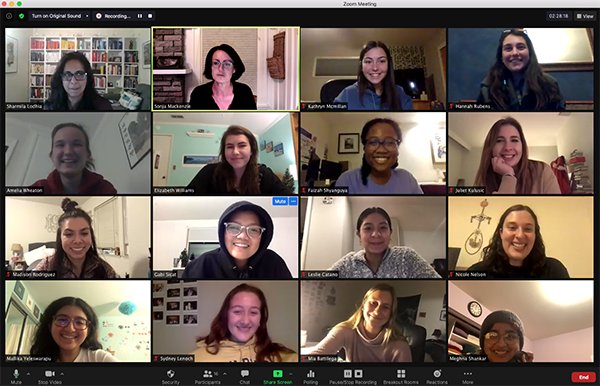Collaborating to Combat Structural Racism from the Classroom

Public Health’s Sonja Mackenzie and Women’s and Gender Studies’ Sharmila Lodhia partnered to educate and engage students on issues of structural racism.
By Sarah Stoddard ’23
In the wake of the murder of George Floyd in spring of 2020, Sonja Mackenzie (Public Health) knew something had to be done to combat the ongoing racialized violence that exists in the country. Mackenzie wanted to do much more than performing allyship, so she decided to create a seminar dedicated to the topic in order to center students in this critical issue. “I really wanted to make sure that this was a course that was cross-disciplinary and at the nexus of various forms of interrogation including critical race theory, legal scholarship, public health, and humanities,” she says. To do this, she decided to collaborate with Sharmila Lodhia (Women’s and Gender Studies) with whom she had worked before and felt a remarkable synergy.
Mackenzie and Lodhia entered this collaboration with the mindset that this would be a learning experience for both them and the students. “We came to the course from a place of humility, knowing what we know and don’t know, and figuring out how we could fill in the holes collectively with a set of students,” Lodhia says. The course, offered in Fall 2020 and cross-listed as PHSC/WGST 187, was designed to address patterns of racial discrimination through case studies in education, criminal justice, health, policing, and more. Mackenzie and Lodhia formulated a purposeful organization of the course that would bring students essential content on the issue and allow them to engage with and think critically about the material. Most importantly, Mackenzie and Lodhia wanted to encourage students to take the theory and concepts from the course and apply them to real-world issues outside of the classroom.
The different areas of expertise that Mackenzie and Lodhia brought to the collaboration allowed them to provide several unique perspectives on the issue of structural racism. Faizah Shyanguya ’21 (Public Health Science) reflects on her experience in the seminar and its unique co-taught style. “Dr. Mackenzie has a public health background which helped me understand racism as a public health issue and a structural determinant of health,” she says. “Dr. Lodhia has a law and women’s and gender studies background which helped in my understanding of many of the legal/policy cases that either perpetuated or pushed back against racism.”
One of the main goals of the course was to prompt critical discussions about racial justice. “Our in-class activities and our final project allowed us to go in-depth about the role that each of us has in achieving racial justice, including educating ourselves and others,” Shyanguya explains. For their final projects, small groups of students were challenged to create action-oriented advocacy projects that addressed structural racism in a specific domain and produced anti-racist material. Two students, Hannah Rubens ’21 (Public Health) and Amelia Wheaton ’21 (Public Health), produced an exceptional project, a website called The Legacy of Redlining in San Jose, that has gone on to receive grant funding to be developed as an environmental justice tool for local community organizations, noted Mackenzie and Lodhia.
A unique aspect of the course was that it could be applied not only in large-scale, global contexts but also to important discussions taking place within the university. “We’re thinking about these issues not only in the outside world as they are manifesting globally and nationally, but also within the university context,” Lodhia says. Learning about combating structural racism on a large scale gave students critical insight into how to solve smaller-scale issues they observed in their own lives. Because the purpose of the class was to understand how racism operates systemically, this individualized perspective was essential. “This course was really about an intervention at the institutional level,” Mackenzie explains. She knew students were in search of more accountability on the part of the institution, more support during this difficult time, and more access to course content that could give them the knowledge they needed as young activists to create change.
Mackenzie and Lodhia hope to offer this course again in the future as just one more way to continue giving students the tools they need to make a positive difference in the world. “My hope for this class is that we can launch forward into the world beyond SCU as a cohort of critical thinkers and doers,” Mackenzie says. “As people who don't just have the ability to understand the scholarship, but who can actually use it for the kinds of actions that are necessary in order to shift the system and challenge the structures of racism that persist. No matter what field the students are moving into, there will be ways, no matter how small or how all-encompassing, for people to be able to do that.”